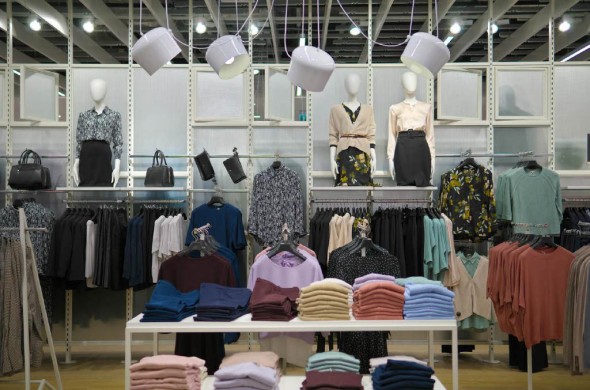The UAE retail landscape is dynamic and ever-changing, with a growing emphasis on luxury brands, of which market revenue amounts to USD 2,881 million in 2024, and a thriving e-commerce market. Staying updated with digital trends is essential for consistent and effective growth in the retail sector, helping to identify consumer preferences and streamline business.
Using expert retail consulting services helps UAE retailers identify opportunities for adapting, innovating, and capitalizing on emerging trends.
Overview of Existing Digital Trends
With new digital trends emerging regularly, taking stock of existing digital trends (and their development) is an important first step.
E-commerce growth
E-commerce in the UAE and the broader MENA region has experienced remarkable growth, especially since COVID-19. While the sector was already thriving before the pandemic, revenue is expected to show a compound annual growth rate (CAGR) of 4% from 2023 to 2027, reaching a market volume of USD 6,854.2 million.
Mobile shopping
Alongside the growth of e-commerce is mobile shopping, which is experiencing significant growth in the UAE. An estimated 28% of surveyed consumers report that their most recent retail purchase was made using their smartphones. Retailers investing in a mobile-friendly online store have a competitive advantage over others.
Social commerce
The UAE has become a leader in social commerce, with retailers selling products or services directly through social media platforms. The digital trend integrates shopping into users’ social interactions and experiences. Considering that 99% of the UAE population has internet connectivity and mobile phone access, the UAE is well-positioned to leverage this trend.
Omnichannel strategies
Omnichannel strategies adopt a holistic approach to integrate online and offline sales and marketing efforts, providing customers with a unified and consistent shopping experience. Consider that in the Middle East, over 55% of the population prefers to shop from retailers with an omnichannel strategy. Maintaining a consistent brand experience while transitioning between channels improves customer satisfaction, and data-driven insights should power these strategies.
Impact of the COVID-19 Pandemic on Digital Adoption in Retail
In 2020, the UAE retail market thrived with a USD 55 billion value but faced significant challenges when the lockdown forced retailers to close their physical doors. Businesses without an online presence had to adapt to survive and quickly develop an omnichannel sales and marketing strategy.
Other developments that emerged due to COVID-19 include the following:
- Promotion of contactless payments to reduce the reliance on cash transactions and increase health and safety
- Enhanced online presence through website upgrades, mobile apps, and digital marketing strategies to cater to the growing online customer base
- Introduction of click-and-collect and delivery options to meet the need for flexible and safe shopping alternatives
- Rise of data-driven decision-making as retailers rely on data analytics and AI to understand shifting consumer behavior
Emerging Digital Trends in UAE Retail
As a global leader in retail, the UAE is at the forefront of digital trends, with the following standing out as significant.
Artificial Intelligence (AI) and Machine Learning (ML) applications
AI and ML enable highly personalized shopping experiences by analyzing customer data to create tailored product recommendations and marketing campaigns. AI-powered bots are also invaluable for providing efficient and effective customer service, assisting with inquiries, resolving issues 24/7, and boosting the shopping experience.
Augmented Reality (AR) and Virtual Reality (VR) in retail
AR and VR offer immersive and interactive shopping experiences, such as virtual try-on experiences that allow shoppers to visualize products in real-time using their smartphones. AR-enhanced in-store experiences are also gaining popularity, allowing shoppers to engage in interactive product information, explore virtual showrooms, and enjoy guided store navigation. For example, Snapchat’s virtual mall contributed a 33% increase in shoppers to the 2023 AR Ramadan Mall.
Internet of Things (IoT) in retail operations
IoT helps streamline business operations in several ways, such as smart shelves, inventory management, and connected customer experiences. For example, IoT devices have sensors to monitor inventory levels in real-time, triggering automatic restock orders when products run low. IoT also contributes to a connected customer experience by providing data-driven insights into customer behavior and preferences, helping retailers personalize marketing efforts.
Opportunities for Retailers in the UAE
The UAE has a few factors working in its favor, including high internet penetration, an affluent consumer base, a tech-savvy population, strong infrastructure, and government support, contributing to the following retailer opportunities.
Leveraging e-commerce growth
The UAE's e-commerce growth presents a valuable opportunity for businesses to invest in building or optimizing online platforms while implementing secure and efficient online payment systems to meet the increasing demand for seamless digital transactions.
Enhancing Mobile Shopping Experiences
Enhancing mobile shopping experiences in the UAE encourages businesses to invest in mobile app development and create mobile-friendly websites with responsive design, catering to the growing number of shoppers using smartphones for online purchases.
Capitalizing on Social Commerce
UAE retailers are positioned to harness the power of social media platforms for marketing and sales and integrate social commerce features into their online platforms to tap into the expanding digital market.
Implementing Omnichannel Strategies
UAE retailers implementing omnichannel strategies ensure the seamless integration of online and offline channels, delivering consistent and unified customer experiences across all touchpoints.
Challenges and Considerations
UAE retailers face exciting opportunities and notable challenges when embracing digital trends.
UAE regulatory considerations
The UAE has regulations governing the online ecosystem and digital marketing efforts, including considerations for privacy laws, data protection, and advertising standards. Businesses must stay updated with these region-specific regulations to avoid legal compilations.
Data privacy and security concerns
With more retailers using big data to boost marketing efforts, retailers must ensure robust data privacy and security measures to protect customer information and uphold trust in online transactions.
Cultural Considerations Influencing Digital Adoption
The UAE is a young and multicultural society with significant ethnic diversity. Businesses are tasked with balancing engaging with the local audience while respecting cultural sensitivities.
Conclusion
Accelerated e-commerce growth, personalized shopping experiences, IoT-driven inventory management, and the integration of AR/VR technologies are just a few of the digital trends in the UAE retail space.
In the ever-evolving digital landscape, staying agile and adaptive is crucial for businesses to remain competitive and responsive to changing consumer preferences and market dynamics.
Partnering with a retail management consultant experienced in the MENA region ensures expert guidance and insights to navigate the evolving market and explore emerging opportunities for sustainable growth.



